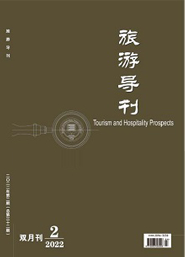


The cover of Tourism and Hospitality Prospect [Photo provided by bisu.edu.cn]
Tourism and Hospitality Prospect is a bi-monthly journal on tourism management that has been jointly published by Shanghai Century Publishing (Group) Co., Ltd and Beijing International Studies University at home and abroad with the approval of the National Press and Publication Administration. Its first issue was published in January 2017.
Development goals
1. It aims to create a China-based platform with a global outlook for the publication of original research theories. It stresses the originality of knowledge, the ideological and theoretical level of research papers, and a combination of Chinese practices and global vision on the basis of guaranteeing result-oriented quality service.
2. It aims to deepen exchanges and mutual understanding among government departments, enterprises, universities and research institutes. It stresses the multi-dimensional, multi-layer, multi-area and multi-discipline research of the Chinese tourism industry and supports the exchanges and interactions between people with different ideas and views in a move to enable different schools of thought contend, promote full expression of different ideas and views, find answers to questions, and strengthen understanding.
3. It aims to build an academic community for promoting learning and progress. It stresses the discovery of new academic knowledge through the sharing of new theories, methods and materials, the education and cultivation of young students and scholars, and consistent progress made by the academic community in the accumulation of knowledge through advancing studies.
Main columns
1. Research Paper
This section mainly features well-designed and structurally complete research results. It supports the adoption of different research methodologies like field research, investigation, empirical research and textual research, all of which should be conducted in accordance with relevant academic norms. With the application of these methodologies, research papers should contain solid evidence to support their viewpoints and make it clear how they advance the studies in certain fields.
The word limit of thematic papers here should be kept between 8,000 and 12,000. However, there is no word limit for research papers with tremendous theoretical contributions.
2. Review Article
This section mainly features review articles, which should comprehensively reflect the progress in the studies of pragmatic fields (e.g. human resources management, industrial policies and community-based development), theoretical arenas (e.g. the life cycle of tourism destinations and tourism experience), and methodologies (e.g. case research and ethnography), sum up previous concepts and methodologies, put forward pending questions and chart the direction of future research activities. They are expected to make theoretical contributions to either clarifying or casting doubt on existing theories or concepts, identifying and depicting new theoretical problems, and breaking new ground in theoretical studies on the basis of current academic development views.
The word limit for review articles here should be kept between 8,000 and 12,000. However, there is no word limit for those with tremendous theoretical contributions.
3. Research Note
This section mainly features short articles with latest research results. It stresses creativity behind their findings, which can be achieved by incorporating existing methodologies into the studies of new phenomena and adopting new approaches to conduct analyses over existing phenomena and relevant theories.
It isn't necessary for articles here to have a complete literature review and explain their methodologies. There are no hard and fast rules on the citation of statistics. The word limit for a research note should be around 5,000.
4. Perspectives & Commentary
The articles featured here should use academically understandable language to explain views and ideas about certain research topics and methods, provide tourism management research with insights on its development direction, approaches and methodologies, open dialogues over new topics, bring an end to old arguments, and come up with thought-provoking views related to major topics and problems in the field concerned.
There are no hard and fast rules on the format of articles here. However, they should have sufficient evidence and logical arguments to support their viewpoints and explain the theoretical and pragmatic values behind their conclusions.
There is no word limit over articles here so that they give full expression to what they want to say.
5. Book Review
The articles featured here should cover old and new books related to tourism management. They must contain clear-cut viewpoints, which underscore the academic values, contributions and shortcomings of targeted publications, in addition to briefing on the framework, content, research methods and major conclusions of relevant writings.
The word limit for articles here should be kept between 3,000 to 4,000.
November 20, 2015

Links
